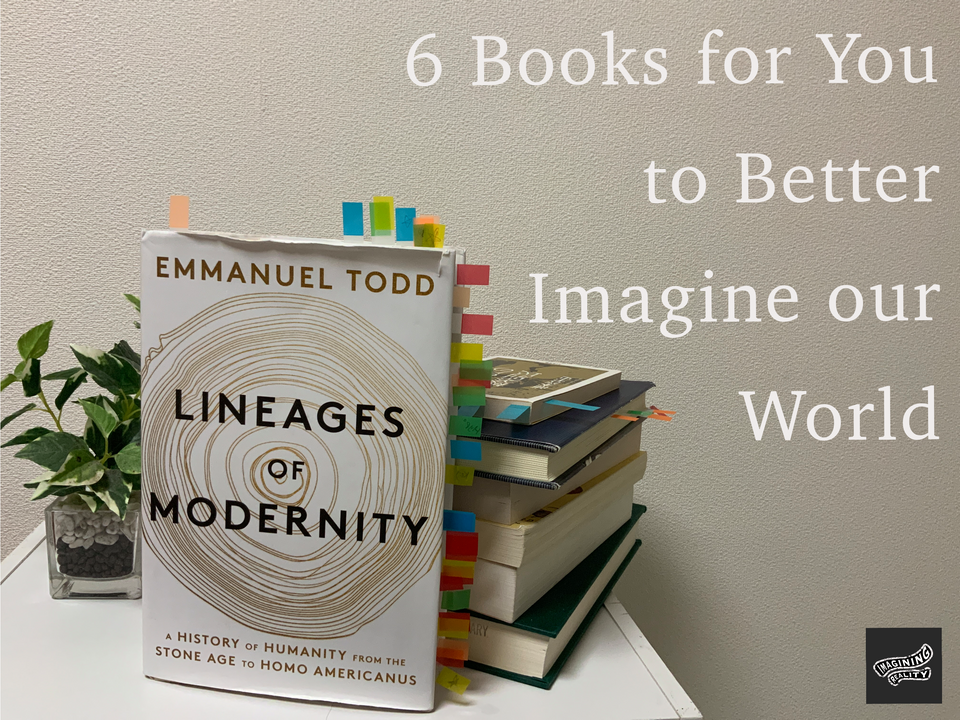6 Book Recommendations for You to Better Imagine Our World

Here are my 6 book recommendations for those who want to better understand our interconnected and complex world. I've split the 6 books into two themes: "Chill Friday Night" and "Damn...Wow".
"Chill Friday Night" are books that you can read on a chill Friday night. They're insightful, entertaining, full of wit, and most importantly, short!
"Damn...Wow" are books that will definitely make you say, "Damn...Wow". Unlike a chill Friday night, these books will be more challenging, lengthy, and for those who enjoy a good struggle in their reading!
"Chill Friday Night"

- The Lessons of History, by Ariel and Will Durant
If you're looking for a short, insightful read – "The Lessons of History" by Ariel and Will Durant is the book for you. When I came across this short 130-page book, I was quite surprised. The only other books I've encountered from the Durants were "The Story of Civilization", which is an 11 volume behemoth that stares at you with the eternal depth to time. It covers almost every bit of history imaginable, although from a very western perspective.
“Normally and generally men are judged by their ability to produce—except in war, when they are ranked according to their ability to destroy.” (From The Lessons of History)
Unlike this, "The Lessons of History" is full of witty sentences about the history of homo-sapiens and comments on things that will make you ponder upon the nature of humanity. Eventually, such thoughts may tempt you to even take on "The Story of Civilization".
So if you've ever wondered, "Why do I need to understand history?" or "What can humanity gain from recording our past?", this book is for you.
“The present is the past rolled up for action, and the past is the present unrolled for understanding” (From The Lessons of History)

2. Brief History of Vice, by Robert Evans
If you’re looking to experiment with brewing your own beer old-school style (by this I mean like 20,000 years ago style) or look into the development of drugs and BDSM, this is the book for you.
With recipes for ancient hallucinants, hard-core drugs, to alcohol infused with poison — the various topics the book covers are impressive.
But as it may be guessed by the title, it also hints at some topics and issues that are often shunned in many history books or museums. The fact that humans are kinda nasty — in the most modern sense of the word.
At least in the westernized world, drugs, narcotics, alcohol, sex, and others have a somewhat derogatory or even heretic connotation. But those very “vices” or “sins” were always at the center of not only civilization but life itself.
One of my favorite chapters from the book goes over the history of alcohol — from a natural alcohol-inducing fruit to the first intentionally brewed beer. This was not some Saturday night getaway from hunting and gathering, but a necessary tool to survive the harsh climates of a world with no Chik-Fil-A or UberEats. The high sugar content and its anti-bacterial properties gave a certain edge for humans and pre-Sapien primates.
So, as popular historic texts such as"Guns Germs and Steel", or "Sapiens" suggest, there are many different human practices that led to the domination of our species. However, what is often misunderstood is that things that are looked down upon today — like internet trolling, foot kinks, potent drugs, and others — contributed just as much to the development of our modern world.
All I got to say is that, every so often, go crack open a cold one with your buddies to celebrate our history the right way.

3. The Bomber Mafia, by Malcolm Gladwell
"The Bomber Mafia" is a revolutionary audiobook by one of my favorite minds, Malcolm Gladwell. If you've enjoyed any of Gladwell's previous books, his new commitment to the audio platform will make your love for his work even deeper.
Beginning with his podcast "Revisionist History", Gladwell has found his new voice through the microphone. He hires voice actors, looks for original audio, incorporates music, that is all coupled with his soothing voice and insightful story-telling, creates the world within his narrative ever so vivid.
His newest "book", is the culmination of the 6 seasons of his podcast and years of writing. "The Bomber Mafia" follows the story of how a small group of military idealists looked to revolutionize war.
They were a group scarred by the pointless mass murders of the first World War, and got together to see if they could create a new way to win wars, without the mass killing.
Their answer? Create an aircraft that could drop bombs with pinpoint accuracy.
The development of such groups, their impact on war, and ultimately, their role in World War 2 is something you'll have to find out by exploring the book yourself.
But trust me, you won't regret it.
"Damn...Wow"

- Pedagogy of the Oppressed, by Paolo Freire (Get the PDF for free here!)
To take a sharp turn from light yet insightful reads, the "Pedagogy of the Oppressed" by Paulo Freire is not a book one reads on a chill Friday night. This book was first introduced to me during a conversation I had with Dr. Anton Treuer, a scholar and leader of the Anishinaabe/Ojibwe people. (Read more about Dr. Treuer and his work here)
If you are looking for justice within your community, it is almost inevitable that you encounter Freire's ideas. This book was written during the time Freire was being exiled from his nation of Brazil, after the 1964 Brazilian coup d'etat.
Freire argues that oppression works upon a "pedagogy", which is another word for "education" or "instruction". And that it is only through the liberation of both the oppressed and the oppressing, that we can be fully "humanized".
I'm here to entice you to read, so I'll finish this short introduction to the book with a few standout quotes. If any book sticks with you today, I hope this is one of them.
"...The great humanistic and historical task of the oppressed [is] to liberate themselves and their oppressors as well"
"For the oppressors, however, it is always the oppressed (whom they obviously never call "the oppressed" but – depending on whether they are fellow countrymen or not – "those people" or "the blind and envious masses" or "savages" or "natives" or "subversives") who are disaffected, who are "violent", "barbaric", "wicked", or "ferocious" when they react to the violence of the oppressors" (56)
"They could eat, dress, wear shoes, be educated, travel, and hear Beethoven; while millions did not eat, had no clothes or shoes, neither studied nor traveled, much less listened to Beethoven. Any restriction on this way of life, in the name of the rights of the community, appears to the former oppressors as a profound violation of their individual rights – although they had no respect for the millions who suffered and died of hunger, pain, sorrow, and despair. For the oppressors, "human beings" refers only to themselves; other people are "things". (57)
"Win the people over" to their side. Such a phrase does not belong in the vocabulary of revolutionary leaders, but in that of the oppressor (95).

2. Lineages of Modernity by Emmanuel Todd
This is the most "academically" challenging book introduced here today.
In many ways, Emmanuel Todd is a hidden fortune-teller. But unfortunately, he may have been a little too good. The French Sociologist, Anthropologist, Demographer etc – as Michael Lind puts it – is always "prematurely and unfashionably correct".
Here are two of his most famous examples:
- In 1976, when Todd was only 25 years old, he published a paper titled "The Final Fall, An Essay on the Decomposition of the Soviet Sphere", in which he predicts the fall of the Soviet Union due to their terrifying infant mortality rates. For many people in 1976, this was absurd. The US had just withdrawn from Asia and the Soviet Union seemed to not only be powerful, but to be expanding its sphere of influence across the world. Furthermore, George W. Bush – who was then the Director of Central Intelligence – said that the CIA had devastatingly underestimated the power of the Soviet Union. But what happened? The Soviet Union crumbled. Although the reason is complex, the diminishing population due to the high infant mortality is something that was impactful to the empire.
- Later in 2001, Todd published a book called "After the Empire: The Breakdown of the American Order", in which he illustrates the decline of the United States as the global hegemon. Bear in mind, this is in 2001, the United States looked as powerful as ever. Yet now in 2021, his arguments seem to have actualized. Todd argued that the moving away of manufacturing jobs due to globalization and other free trade policies not only polarized the nation, but forced the United States into "theatrical micromilitarism". Theatrical micromilitarism is where the "powerful empire" of the US fights weaker, less developed nations, such as Iraq, to show off their military prowess to the rest of the world. If only the book was read more in 2015, it may have caught more traction.
Like this, Todd's words were so ahead of his time, they remained within a smaller academic circle.
In his most recent book, "The Lineages of Modernity", Emmanuel Todd brings his insight into our world again. In this account, he attempts to analyze, dissect, and understand the incredibly complex and confusing contemporary world of globalization, technology, and more. Yet unlike many other studies on such subjects, his focus is not on the economics or politics – which he refers to as the "conscious level" of our world – but on the family system; the unconscious. Through such accounts, he is able to explain the divergence of societies into a more individualistic or communal state, and the impact those have on the "conscious level" of the world.
This again, is not a light read. It's written in a highly specialized language and riddled with challenging ideas; so it's a book that must be tackled with great patience – but the payoff is incredible.

3. The Metamorphosis of the World, by Ulrich Beck
This book by sociologist Ulrich Beck focuses on one main idea: our world isn't changing, it's metamorphosing. Like how a caterpillar metamorphs into a butterfly that is unrecognizable, our world must be understood like this as well.
"Metamorphosis then also means that the past is reproblematized through the imagination of a threatening future"
The common notion of "change" implies a part of the world is always consistent and recognizable. Unlike this, Beck describes and helps us imagine how the world metamorphs. From climate change, politics, technology, and more, his vivid illustrations and examples may allow your thinking to go from caterpillar, cocoon, and finally a magnificent butterfly by the end of the book.
"The Metamorphosis of the World" was a posthumous one, which beautifully captured Beck's ideas about the radically shifting world he sought to understand.
So that's it for today! Let me know if you have read or are interested in reading these books!
If you want to support my work and be entered into a raffle that could win you any of these books and more, consider supporting me on my Patreon!
See you next week!
![[Guest Post] Exploring Colonial History through Art](/content/images/size/w750/2023/11/graphite-island-banner.png)
